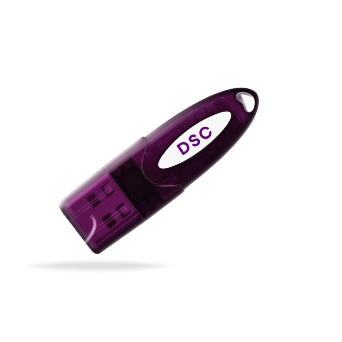11-Sep-2025
GST DSC 2026 | Use Digital Signature for GST Portal Filing
With GST 2.0 trending and all the latest updates being in the news, people have a lot of doubts. New slabs, revised prices, and compliance updates are on everyone's mind. But when it comes to filing GST, there are loads of questions: Will the process be the same as before, or is it going to be different? Will digital signatures still be mandatory for all types of returns? How to make sure your filings are GST error-free?
If you've been wondering how to navigate all this, you're not alone. Well, to start with, one thing is clear: Digital Signature Certificates (DSC) are more important than ever.
A GST DSC ensures filings are seamless, secure, and legally accepted by the GST portal. With the right approach, businesses can stay ahead and avoid last-minute chaos. With DSC in place, businesses can stay compliant, file on time, and avoid last-minute surprises.
Need a Digital Signature for GST? Buy Capricorn DSC today and file with confidence!
First things first – GST Registration
Registering for GST is the first step you need to take on the GST portal. This process allows your business to comply with GST regulations. You can start filing returns, claiming input credits, and conducting transactions legally.
Who Needs to Register on the GST Portal?
- Businesses with turnover above the prescribed threshold (₹40 lakh for goods, ₹20 lakh for services in most states)
- Companies, LLPs, and partnerships
- E-commerce operators and online sellers
- Casual taxable persons or non-resident taxable persons
- Persons required to collect tax at source (TCS) under GST
- Persons making inter-state taxable supplies
DSC in GST Filings
GST DSC helps businesses maintain credibility and avoid portal rejections. You might be on the GST portal for regular returns, annual reconciliations or special submissions. A digital signature for GST portal becomes mandatory.
Here is what a GST Digital Signature helps in:
1. Authentication of Returns: All digitally signed returns are recognized as legally valid by the GST portal.
2. Secure Submission: DSC ensures the data submitted is tamper-proof and cannot be altered after signing.
3. Multiple Filings Simplified: For businesses with multiple branches or signatories, DSC makes it easy to submit filings without manual paperwork.
4. Amendments & Corrections: Even when correcting errors or submitting revised returns, DSC provides legal verification to avoid compliance issues.
5. Audit & Reconciliation: Annual returns and reconciliation statements, such as GSTR-9C, require DSC to certify that the financial details match the records.
DSC Registration on the GST Portal
Before you can use a Digital Signature Certificate (DSC) for filing GST returns, it must be registered on the GST portal.
Steps to Register DSC on GST Portal:
1. Log in to the GST portal using your credentials.
2. Navigate to “My Profile” and select your profile from the options provided.
3. On the next page, you will see all your details. On the right side, click “Register/Update DSC”.
4. Select the designated signatory under the PAN of the authorized signatory.
5. Check the box confirming that you have downloaded the DSC utility. Click “Proceed”.
6. Select your DSC from the options displayed on the screen.
7. After confirmation, the DSC will be registered successfully.
Uploading & Signing GST Returns with DSC
Once your GST registration is complete, do GST login and the next step is filing returns. This is where the role of the Digital Signature Certificate begins. The DSC allows you to digitally sign your returns, ensuring that all submissions on the GST portal are secure, authentic, and legally valid.
When uploading your returns, the portal will prompt you to select the DSC of the authorized signatory. This applies to:
- Monthly/quarterly returns
GSTR
GSTR-3B
GSTR-5 (Non-resident),
GSTR-6 (Input Service Distributor),
GSTR-7 (TDS deductors), GSTR-8 (TCS by e-commerce operators)
GSTR-8 (TCS by e-commerce operators)
- Annual returns
GSTR-9
GSTR-9A (Composition)
GSTR-9C (Reconciliation statement)
- One-time or special returns
GSTR-10 (Final return)
GSTR-11 (for UIN holders)
Apart from DSC, EVC is also used in GST filings. Not sure what is EVC in GST? Well, You're in the right place!
Learn all about what is EVC in GST, What is submit with DSC and EVC in GST?, difference between DSC for GST and EVC in GST, and more. Just CLICK HERE!
GST DSC Maintenance – Renewal, Revocation, & Loss
A Digital Signature Certificate (DSC) is valid only for a fixed period, and proper maintenance is crucial to ensure uninterrupted GST filings. You need to stay on top of renewal, revocation, or replacement processes to avoid portal errors or rejected submissions.
DSC GST Renewal
- DSCs are typically valid for 3 years depending on the provider.
- When your DSC is about to expire, it must be renewed and re-registered on the GST portal.
- Filing returns with an expired DSC will result in errors or failed submissions, delaying compliance.
GST DSC Revocation
- If a signatory leaves the company or their authorization is withdrawn, the DSC should be revoked immediately.
- Using a DSC of an ex-employee or unauthorized signatory can lead to legal complications and liability issues.
DSC GST Lost or Corrupted Token
- If the DSC token is lost, corrupted, or malfunctioning, it must be replaced to continue filings without interruption.
Want to Buy GST digital signature? Get Capricorn DSC for GST today and make every GST filing secure, fast, and hassle-free!
Conclusion
A DSC GST is the foundation of smooth and legally valid GST compliance. From GST login to filing monthly, quarterly, or annual returns, a DSC for GST ensures that every submission, and DSC GST return, is secure and authenticated.
With Capricorn CA, businesses can easily get their DSC for GST registered and maintained, making filings faster, hassle-free, and fully compliant. Having a properly registered DSC eliminates errors, prevents portal rejections, and ensures seamless GST submissions every time.
In short, a DSC GST is your key to stress-free GST filings.


